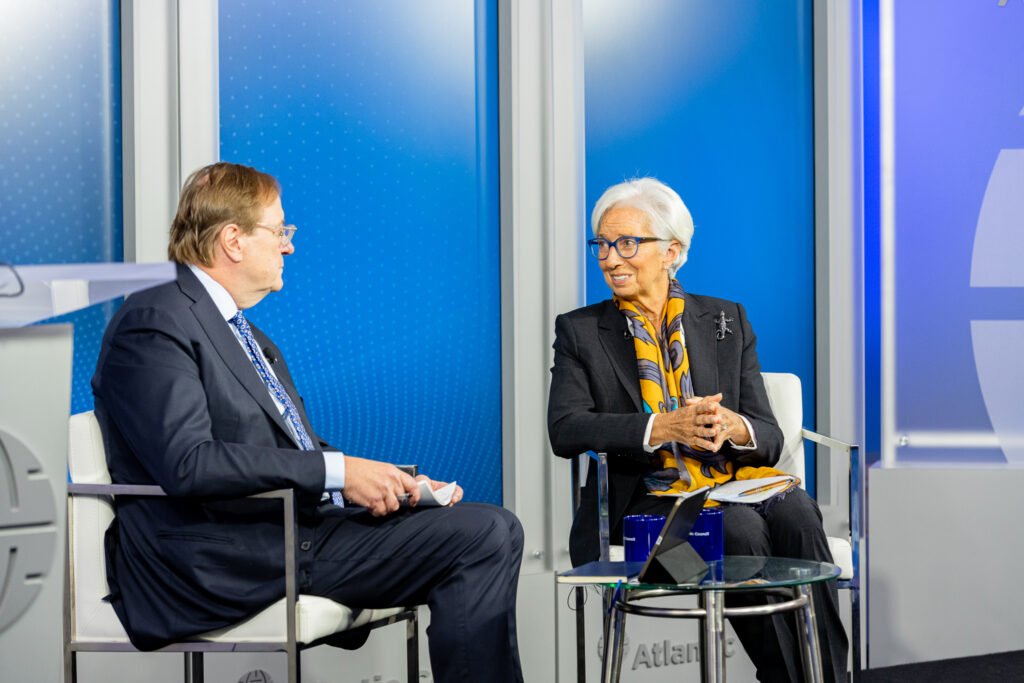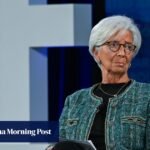The role of a global reserve currency should “never be taken for granted,” said European Central Bank (ECB) President Christine Lagarde on Wednesday at an Atlantic Council Front Page event on the sidelines of the International Monetary Fund-World Bank Annual Meetings.
Lagarde addressed a host of issues facing the continent, including the European Union’s (EU’s) ambition to create a central bank digital currency (CBDC), the ECB’s efforts to keep prices stable, what Europe’s lagging economic competitiveness means for the ECB’s fight against inflation, and the outsize impacts that the next US president’s approach to trade will have on the global economy.
Below are more highlights from this conversation with Lagarde, which was moderated by Atlantic Council President and CEO Frederick Kempe.
Fighting inflation
- Assessing the ECB’s monetary policy over the past two years, Lagarde pointed out that inflation in the eurozone stood at 10.6 percent in October 2022 and has come down to below 2 percent. “We have reasons to believe that it will move up again above 2 percent in the next few months,” she said, “but it’s really good progress.”
- Lagarde explained that the ECB is driven by a “pretty simple and straightforward” mandate of “price stability,” unlike the US Federal Reserve, which also targets growth.
- Nevertheless, former ECB President Mario Draghi’s report on European competitiveness, which Lagarde called “a severe but just diagnosis of where Europe is,” touched on major issues of concern to the ECB’s efforts to combat inflation, including low productivity, high energy costs, and the need for further efforts on digitalization.
- To make progress on digitalization, she said, “You need capital, and you need capital that is prepared to take risks. This is not something that we are very good at in Europe.” To remedy this, Lagarde said she supports a capital market union that is “common to all, at least countries of the euro area, if not the whole of the European Union,” which she said would require “a single integrated market from a regulatory point of view.”
A digital eurozone?
- Lagarde spoke of her support for a European CBDC: “When you look at central bank money, why would it not also turn digital? Why would we always and forever rely on banknotes as our basis for the currency?”
- One potential benefit of a European CBDC, Lagarde said, would be helping to interlink international payments systems, which she said “are very fragmented in Europe. If you want to pay digitally, there are at the moment thirteen countries that are operating in an isolated manner and which are not linked to the rest of the system,” she said. “Having a digital euro is a way to actually bring that together.”
- This would have major implications for sending remittance payments from Europe. Currently, sending remittances “takes forever,” Lagarde said. “It’s very expensive. It does funny loop-de-loop circuits around the world for some countries.” One aim of a European CBDC would be to interlink payment systems “so that remittances can go back to the Philippines or to Thailand or to Mexico in a smooth and cheap way.”
- The European CBDC is currently in an exploratory phase, but Lagarde said she hopes to see the European Parliament vote in 2025 to create one. She added that an EU legal framework for the digital currency will need to be completed as well, but along with the legislation, “the two are coming together.”
Tariffs and transatlanticism
- Trade, Lagarde said, is beneficial for innovation, economic growth, and poverty reduction. “So trade barriers, whether they are tariff or nontariff barriers, are likely to have a negative impact on growth,” she said. “I think it would have an impact on inflation as well and not one that would be particularly welcome.”
- While acknowledging that “there is clearly overcapacity in certain sectors in China,” Lagarde said that “periods of restrictions and barriers” in US trade policy “have not been periods of prosperity and strong leadership around the world,” and the next US president “should at least bear that in mind.” Rather, she said, US economic prosperity and leadership has “most often coincided with periods of trade around the world.”
- Lagarde sounded a note of caution on China’s and Russia’s attempts to push their own currencies as means of international payments at the expense of the dollar and the euro. Noting that “the renminbi is neck to neck with the euro on trade finance,” Lagarde said that “we all need to be attentive to new developments” on Chinese and Russian efforts to diminish the role of the dollar and the euro.
Daniel Hojnacki is an assistant editor on the editorial team at the Atlantic Council.
Watch the full event
Further reading
Image: European Central Bank President Cristine Lagarde speaks with Atlantic Council President and CEO Frederick Kempe on October 23, 2024.






















